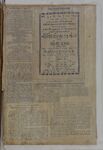 |
vol. title: Vol Four of The Theosophical Society of The Arya Samaj of Arya-wart vol. period: Sept 1878 – Sept 1879 pages in vol.: 350 |
The Theosophists in Bombay
...
Whom Shall We Worship?
We have received the following letter:—
Rear Sir,—I notice a suggestion in the last number of The Spiritualist for united religious services among those who profess and call themselves Spiritualists; but there is a lion in the path of no phantom kind. Can we agree as to the Worthy One to whom we shall render this homage, or what form the rendering itself shall take? Are we to adore sublimated matter, omnipotent force, fortuitous concurrence, or limiting ourselves to become Pantheistic, Brahministic, awe-struck venerators of the angel “John King?” or fusing all minor differences, to be content with mystic gazing into the infinite moonshine of the future?
Are we to worship round a dissecting table, a spiritually wrecked music stool, a test-tube of blue sky, in an oak grove, before the unveiled Isis, or in Lamb’s Conduit-street, on our heads or our heels? Are our prophets to be decently schooled, or is Milton to be allowed to have his grammar muddled, as I have too often heard it muddled, by “speakers with tongues,” and “pythonesses,” on various “progressive” platforms? Finally, if the guides Shakespeare and Milton should differ on “fundamentals,” do we take our choice, or fight it out?—I am, sir, yours ever,
Our reply to the above letter is, “Worship God.”
If our correspondent asks for a more precise definition of The Master who is to be adored, the following committee might be appointed to give it—viz., the Archbishops of Canterbury and York, the Pope of Rome, the Sultan of Turkey, the Patriarch of the Greek Church, the chief representatives of the Brahminical and Buddhist Churches, and the President of the National Association of Spiritualists, likewise those worshippers of the Unknown God, Professor Huxley and Professor Tyndall, whose “position” is that they are unacquainted with the Deity, and under no obligation to define Him. Furthermore, Mr. Bradlaugh might be appointed to represent Atheism. Our correspondent, after making affirmation that he has no undue prejudice or bias for or against any of the sections of religious thought represented by the rest of the members of the committee, should be appointed chairman.
If these heads of religious thought cannot agree among themselves as to whom we shall worship, even under the guidance of their unprejudiced chairman, why ask for a decision through the public press?
Would he repudiate the definition arrived at by this representative committee, and appeal for an answer to the multitude, to the tens of thousands of preachers in the tens of thousands of the pulpits of the world? Would he appeal to the myriads of teachers of those millions of different religions which probably prevail on other planets than ours? If so, a Spiritualistic preacher has perhaps as much right to be heard as any other, therefore we bring one of the inspirational sermons of Lizzie Doten, the American trance medium, to the front. Her text was, “And I saw no temple therein.” (Rev. xxi. 22):—
’Twas the ominous month of October— |
* The dragon ship of the Norse mythology.
A Hindoo Theatrical Announcement
...
Fools and Philosophers
...
Editor's notes
Sources
-
London Spiritualist, No. 331, December 27, 1878, pp. 301-2

